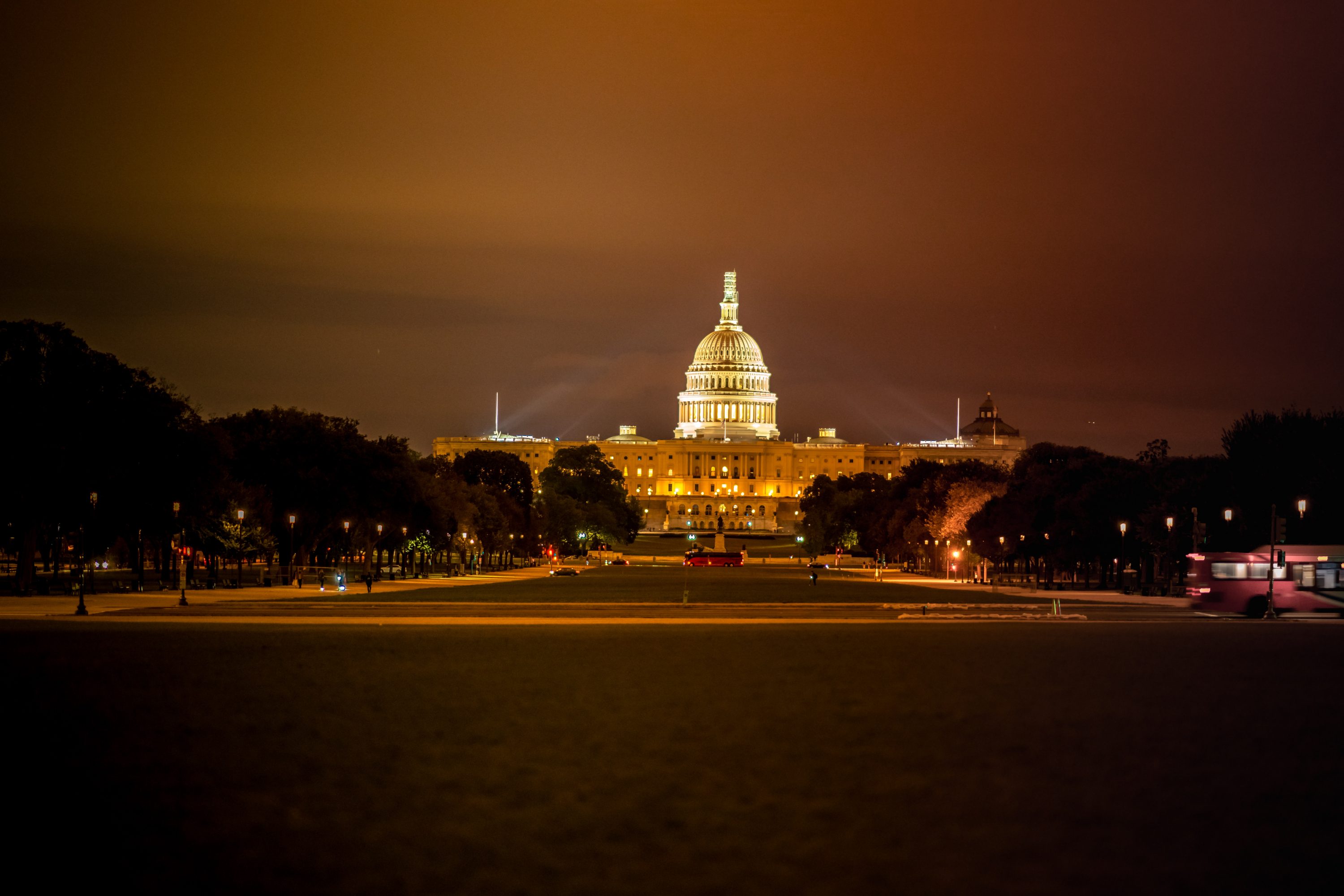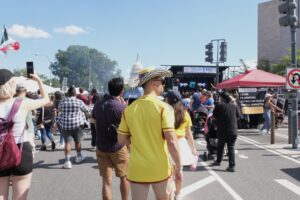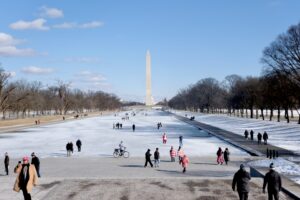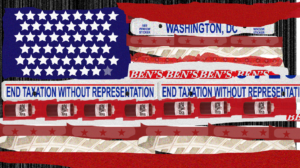In the wake of an attack on the U.S. Capitol and in preparation for Joe Biden’s upcoming presidential inauguration on Jan. 20, Washington D.C. is undergoing a rapid security transformation to guard the Capitol and city against another wave of violence perpetrated by pro-Trump combatants.
Following the Jan. 6 attacks on the Capitol as the Senate convened to discuss the certification of 2020 election results, the FBI warns of potential violence during the inauguration and in the surrounding days, both in D.C. and state capitals. In response, the Department of Defense has deployed the most National Guard troops to the District in history to patrol closed-down streets and public transportation systems. Mayor Muriel Bowser and private businesses are also taking proactive steps, such as shutting down public transportation and lodging, to ensure the safety of D.C. residents throughout the week.
When Allison Yingst (MSB ’24) visited Georgetown as a prospective student last March, she found the city in panic mode: COVID-19 was spreading and businesses were shutting down. Ten months later, just as Yingst prepares for her spring semester in D.C., the city is undergoing another district-wide lockdown.
“You can’t even get close enough to see any of the monuments—the Mall is closed. All the blocks in any vicinity to the Capitol—all of those are closed,” Yingst said.
The failed insurrection on U.S. Capitol grounds by members of far-right white supremacist groups took five lives and quashed the nation’s 220-year streak of a peaceful transition of power in a single afternoon. For D.C. residents and elected officials, including Vice President Mike Pence and Speaker of the House Nancy Pelosi, President Trump’s incitement of violence put their lives in danger and forced an unprecedented militarization of the city.
As residents in the District brace themselves for another wave of political violence, the city’s 9/11-inspired fortress of security and surveillance grows. Bowser has called on federal government officials to extend the proposed lock-down dates, the shutdown began later that day—eight days earlier than originally planned.
“There are more troops right now in Washington, D.C. than Afghanistan, and they are here to defend us against the commander in chief—the president of the United States—and his mob,” Representative Seth Moulton (D-MA) said in a speech on the House floor on Jan. 13.
While all parts of the District will have a heightened security presence, the area within the inauguration security perimeter will be the most formidable. Delineated with an 8-foot non-scalable fence, topped with concertina wire in some areas, the U.S. Capitol, Senate, congressional office buildings, 2-mile stretch of the National Mall, and other parts of downtown Washington are sealed off from the rest of the city. Within this perimeter, up to 25,000 National Guard troops assemble roadblocks and man checkpoints; armored personnel carriers and Humvees abound. The Guard is armed with M-4 carbines and M-9 handguns and permitted to use lethal force when they see fit. Combined with 750 active-duty personnel, the most violent transition of power in American history will also be its most secure.
Yingst first came face-to-face with D.C.’s evolution into a city under military occupation during an ordinary trip to Foggy Bottom by metro. “There were people in full uniform, completely armed—posted up on every single corner—and there were also cop cars parked on every street,” she said. “I never felt in danger. Honestly, it was more of just a sad feeling.”
Bowser has called the state of emergency continuing through Jan. 24 “the new normal” for security in D.C. even after the emergency declaration is lifted.
Enhancements to D.C.’s formidable security already seem to be working. The weekend before Inauguration Day, Capitol Police made at least two arrests at security checkpoints near the U.S. Capitol building. A Connecticut woman stands accused of impersonating a police officer, and a Virginia man carrying unauthorized inauguration credentials was also arrested. Police found a loaded pistol and more than 500 ammunition rounds in his possession.
Because the military’s display of force is not an ironclad deterrent against acts of violence against the U.S. Capitol, federal buildings, and the lives of government officials, many officials are urging their constituents to stay at home during the inauguration.
“Due to the unique circumstances surrounding the 59th Presidential Inauguration, including last week’s violent insurrection as well as the ongoing and deadly COVID-19 pandemic, we are taking the extraordinary step of encouraging Americans not to come to Washington, DC and to instead participate virtually,” a joint statement by Bowser, Maryland Governor Larry Hogan, and Virginia Governor Ralph Northam read.
Georgetown University is sending the same message to its students. In an email from the Office of Emergency Management on Jan. 13, the university urged students to avoid downtown D.C. in the coming days. According to the email, Georgetown’s campuses will be closed on Jan. 20 with all instruction continuing virtually.
On Jan. 11, Bowser extended her order prohibiting indoor dining and museum openings until Jan. 22. She acknowledged that potential threats of violence to disrupt the transfer of power to a Biden administration had influenced her decision.
Bower has also moved to reduce transportation in downtown Washington. Beginning Jan. 15, WMATA closed 13 downtown metro stations. Bus routes venturing into closed zones in the District have closed or rerouted. Bowser has also coordinated with Northam to shut down four bridges crossing into D.C. for 48 hours beginning Jan. 19.
The week before the inauguration, public pressure has mounted on vacation rentals, hotel chains, and airlines to take additional security measures—even if it means taking a financial hit.
After several D.C.-based Airbnb hosts discovered their guests had stormed the Capitol building, the vacation rental company banned members who had participated in illegal acts while staying in homes throughout the District. On Jan. 13, Airbnb decided to cancel all reservations in D.C. the week of the inauguration.
“We are continuing our work to ensure hate group members are not part of the Airbnb community,” read a statement published on the Airbnb website.
While the closures are intended to prevent potential attackers from traveling to the District for the inauguration, advocates for the houseless community have expressed concern the short notice cancellations may cause housing instability during the inauguration period.
While several local hotels have heeded the call from activist organizations to close, large hotel chains that have properties near the National Mall and the U.S. Capitol, like Marriott, Hyatt, and Hilton remain defiant. Bowser has so far resisted calls from activists to use her emergency powers to shut them down.
“If you’re harboring people who are here to commit violence off the hotel’s property, that’s still a huge problem,” Alex Dodd, an organizer of Shutdown DC said in an interview with DCist. “Your security team, the hotel security team, is not going to protect the rest of the city from the violence that these folks are going to bring.”
Even airlines that transported Americans intent on overturning democracy from all over the country in the days leading up to Jan. 6 are reckoning with their security responsibility leading up to the inauguration. Delta Air Lines has banned the checking of firearms for passengers flying into the D.C. Metro Area starting Jan. 14 until Jan. 20. Other major airlines—including American, United, and Southwest—followed Delta’s lead.
Tensions in D.C. remain high in the days following the Capitol insurrection and preceding the inauguration. On the morning of Jan. 18, those inside the Capitol complex believed the building was under attack due to the sighting of smoke plumes close by. Capitol Police sent out an alert telling congressional staffers to shelter in place immediately. The smoke was a false alarm, emitting from the explosion of a propane tank under a nearby bridge and destroying a homeless encampment.
The military stands ready for an attack like that: one that comes from the outside-in. But the airtight security perimeter likened to the American military’s unbreachable Green Zone in Baghdad cannot ease the fears of high-ranking officials that an attack may come from the thousands of troops and law enforcement officers deployed in the nation’s capital.
To confirm no person deployed within the perimeter has ties to extremist groups or holds extremist views themselves, all National Guard troops are being vetted not just once, but three times; the troops have also completed training to spot signs of an insider attack.
This worry emerges as the public is learning an uncomfortable fact tying the military and law enforcement to the Capitol insurrection. According to The New York Times, six former members of the military and two off-duty police officers were among the more than 100 people charged with crimes while storming the Capitol. Ashli Babbitt, the woman killed by a Capitol Police officer just outside the Speaker’s Lobby, was also an Air Force veteran.
As the clamor swells for the military to investigate and root out white supremacists in its ranks, the Joint Chiefs of Staff sent out a memo to all members of the armed forces on Jan. 12. Their statement reminded the troops, whose duty is to defend and protect the Constitution, that their loyalty does not lie with any political figure or ideology.
President-elect Joe Biden’s swearing-in will take place at noon on the west front of the Capitol.





